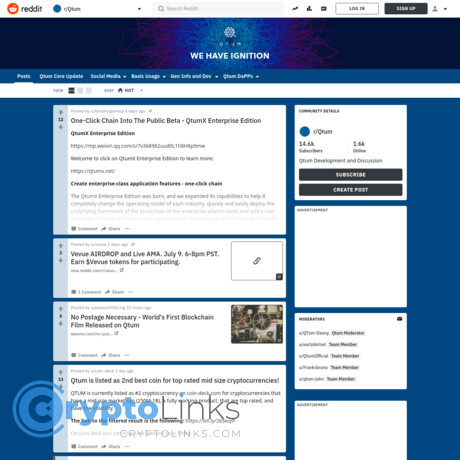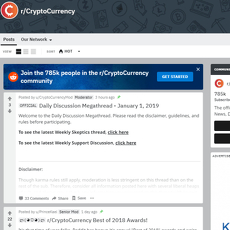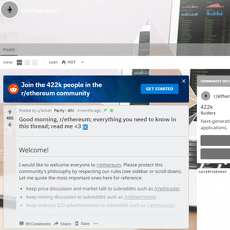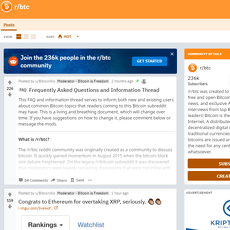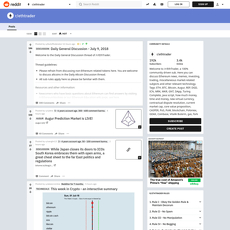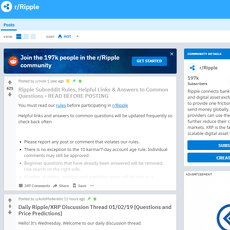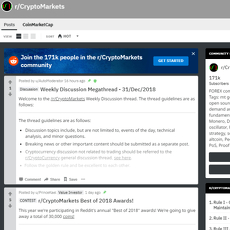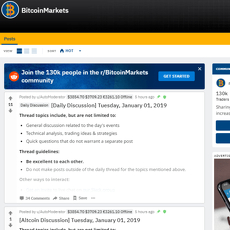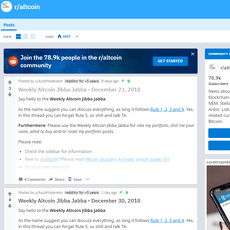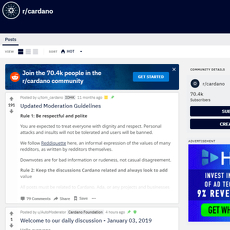r/Qtum Review
r/Qtum
www.reddit.com
r/Qtum Reddit Review Guide: Everything You Need to Know (+ FAQ)
Is r/Qtum actually useful for staying on top of the Qtum blockchain—or is it just another crypto echo chamber where the loudest voices win?
If you care about real updates, smarter research, and fewer time-wasting threads, you’re in the right place. I’ve spent a lot of time checking what works (and what doesn’t) on r/Qtum, and this guide shows you how to use the subreddit without getting lost in noise.
Describe problems or pain
Here’s the honest reality: Reddit can be gold—or a rabbit hole.
- Qtum vs QTUM confusion: The subreddit is about the Qtum blockchain, but you’ll still see people show up asking about QTUM, the Defiance Quantum ETF (a stock). That mix-up derails threads and wastes time.
- Outdated answers: Old wallet links, deprecated staking guides, and pre-release instructions can stick around for years and still rank in searches.
- Noise > signal: Low-effort price bait, “when moon?” comments, and recycled narratives can bury useful dev updates or support posts.
- Missed gems: Some of the best content lives in comments under a quiet thread or in a sticky you scrolled past because it “looked old.”
- Scam risk: Fake “support” DMs and too-good-to-be-true giveaways appear anywhere open communities exist—Reddit included.
Part of this is how online communities work. The 90-9-1 rule (Nielsen Norman Group) says about 1% create most content, 9% contribute occasionally, and 90% mostly lurk. That means a small slice of users can shape what you see—good or bad. Your job is to filter fast.
Real example: A thread titled “QTUM pumped 8% today — what happened?” might be talking about the ETF, not the coin. Clues: mentions of Nasdaq, SEC filings, or holdings like IONQ and RGTI. Wrong asset, wrong take.
Promise solution
Here’s what I’m going to do for you in this guide:
- Show you how to judge r/Qtum as a resource (not just on vibes).
- Point out the post types that are worth your time—and how to surface them quickly.
- Give you a simple method to find the best answers fast, even if a thread is old.
- Flag common pitfalls, including the QTUM ETF confusion, so you don’t act on the wrong info.
- Wrap it with a clear FAQ and a clean, repeatable workflow you can use in minutes a day.
What to expect (and how I judge a subreddit)
I’m ruthless about usefulness. Hype doesn’t pass. Here’s the lens I use when I open a crypto subreddit:
- Activity quality: Is there steady, recent discussion? Are support questions getting answers within 24–48 hours?
- Moderation: Are obvious shills, spam, and phishing attempts removed? Are flairs clear and used?
- Accuracy: Do “official” updates link to verifiable sources (GitHub releases, explorers, docs, or the project’s site)?
- Usefulness: Are there practical guides, troubleshooting threads, and sticky posts that get updated?
Quick checks I run in seconds:
- Timestamp pass: Look at the last five threads. Are three of them within the past week? Good sign.
- Engagement ratio: Scan comment counts. A support post with thoughtful replies beats a price meme with 100 one-liners.
- Link hygiene: Are links to wallets, explorers, or docs official and HTTPS? Anything sketchy = back button.
- Cross-confirm: If someone claims a new release, I check for a matching tag on GitHub or a post on official channels.
Real example: “Staking not receiving rewards after 48h (Qtum Core 22.x)” — I’d expect replies mentioning current wallet versions, recent chain parameters, and links to a changelog. If the top answer references a 2019 guide, that’s a red flag.
What you’ll walk away with
By the end of this guide, you’ll have a simple system to get real value from r/Qtum without living on Reddit:
- Updates that matter: How to spot genuine announcements and release notes.
- Faster research: A search trick to surface the best past answers in seconds.
- Wallet and staking help: What a trustworthy support thread looks like (and what to ignore).
- Dev awareness: Where to find meaningful EVM/UTXO and roadmap discussions without fluff.
- Noise filter: A lightweight checklist to separate signals from low-effort chatter.
Curious what r/Qtum actually covers, who gets the most value from it, and how the subreddit is organized so you can skim smarter? Let’s map that out next—want the 30-second tour or the deeper look?
What r/Qtum is, who it’s for, and how it’s organized
What r/Qtum covers: the Qtum blockchain, its tech stack, wallets, staking, ecosystem news, and community support—not the QTUM stock ticker.
r/Qtum is the subreddit for the Qtum blockchain—not the “QTUM” ETF you’ll see on stock sites. Expect threads focused on:
- Core tech: Qtum’s hybrid UTXO + EVM design, the Account Abstraction Layer, smart contracts, gas fees, and node behavior.
- Wallets: Qtum Core desktop, mobile options, and hardware wallet compatibility. People often swap setup tips, backup steps, and update checks.
- Staking: How to configure offline staking, set up a super staker, track rewards, and keep uptime healthy.
- Ecosystem news: Release notes, integrations, tools, and QRC-20 token projects.
- Support: Troubleshooting posts, quick fixes for sync issues, stuck transactions, or contract calls.
It does not cover the QTUM (Defiance Quantum ETF). If you run into ETF chatter, it’s usually a mix-up. Use search tweaks like “Qtum -ETF” or stick to Announcement/Development flairs to stay on the blockchain track.
Real examples you’ll commonly see:
- “Qtum Core update—what changed and do I need to upgrade today?”
- “Offline staking: delegation shows 0 rewards—what did I miss?”
- “Contract not deploying on Qtum EVM—works on testnet, fails on mainnet.”
- “Heads-up: new tool for monitoring super stakers”
Who gets the most value: Qtum holders, builders, curious researchers, and anyone tracking project updates without living on Telegram or Discord.
If any of these describe you, you’ll likely get real mileage from r/Qtum:
- Holders and stakers who want reliable wallet tips, security reminders, and quick answers when something breaks.
- Builders deploying Solidity contracts on Qtum’s EVM, testing gas assumptions, or looking for peers who’ve solved the same edge case.
- Researchers and analysts tracking network progress, tooling, and release cadence without scrolling noisy chats all day.
- Node operators who care about uptime, peers, pruning/sync strategies, or resource footprints.
- Newcomers learning the basics: where to download official software, how to back up, how staking actually pays out.
I think of it as a utility feed—when you need a trusted hint fast, you go there, search, and move on with your day.
Community rules and etiquette: check stickies, follow flair tags, avoid price-only spam, cite sources, and report scams promptly.
The best experiences here start with simple etiquette. A few rules of thumb that keep the signal strong:
- Read the stickies first. Mods often pin wallet updates, release notes, or scam warnings.
- Flairs matter: use and follow Announcements, Development, Wallets, Staking, and Support to route questions and filter threads.
- No price-only spam. If market chat is allowed, it’s usually in a specific thread. Respect the lanes.
- Cite sources: link to GitHub commits, official posts, or explorers when you make a claim. Screenshots help—but redact sensitive info.
- Report suspicious links and never engage with unsolicited DMs offering “support.”
- Never share your seed phrase or private keys—no legit helper will ever ask.
“Strong communities are built on receipts, not rumors.”
Clear rules and consistent flairs aren’t just decoration—they’re how the subreddit stays useful. If you’ve ever felt lost in a crypto thread, you’ll appreciate how much structure trims the nonsense.
Post types you’ll see
Expect a clean mix of practical posts that keep you informed without wasting time:
- Announcements: New releases, network updates, event notes. Example: “Release: Qtum Core X.Y.Z (changelog + upgrade steps)”.
- Development updates: EVM behavior, tooling, RPC quirks, AAL specifics. Example: “Contract execution cost differences vs Ethereum—my test results”.
- How-tos and guides: Wallet setup, backups, staking delegation, safe upgrades. Example: “Offline staking in 10 minutes—step-by-step with screenshots”.
- Support questions: Sync stuck, forks, mempool oddities, or reward timing. Example: “Node stuck at height N—what fixed it for me”.
- Research links: Ecosystem trackers, explorer tips, or comparative analyses. Example: “Comparing Qtum gas dynamics across mainnet/testnet”.
- Market chat (when allowed): Sentiment, catalysts, and macro tie-ins; usually contained to specific threads.
If you want speed, filter by Announcement and Development flairs and check stickies first. That’s where the highest-utility posts tend to live.
Quick gut check: Is the subreddit actually helpful right now, or is it just noise this week? In the next section, I’ll show you how I gauge health in seconds—post frequency, comment depth, and how fast real questions get answered. Curious what that snapshot looks like today?
Quality check: Is r/Qtum helpful right now?
I treat the r/Qtum subreddit like a living dashboard. Before I trust it for research or support, I run a fast quality check. It takes about three minutes and tells me if the community is active, moderated, and worth my time today.
“Slow answers kill curiosity; fast answers build commitment.”
Activity snapshot
If a subreddit responds quickly and consistently, it usually means you’ll get help when you need it. Here’s how I gauge that—without spending an hour scrolling:
- Weekly post frequency: Open New and count how many unique threads appeared in the last 7 days. A steady cadence (not just bursts around news) signals healthy interest.
- Comment depth: Click into the last 10 support or how-to threads. If most have at least a handful of replies and one marked solution (or a clear acknowledgment), that’s a good sign people actually help—not just lurk.
- Response time: Check the timestamp of the first helpful reply on recent questions. Under 6–12 hours is solid for a niche chain subreddit; under 3 hours is excellent.
This isn’t just gut feel. Community research shows that fast, quality responses reinforce participation and retention. See Kraut & Resnick’s work on online communities, and Matias (2019) on the impact of timely volunteer moderation. When answers land quickly, newcomers stick around—and knowledge compounds.
Moderation and spam control
Good moderation doesn’t feel heavy-handed; it feels safe and readable. Here’s what I look for on the Qtum subreddit:
- Clear flairing: Threads labeled Announcements, Wallets, Staking, or Development make it easy to find real substance. If flairs are enforced, spam has a tougher time slipping in.
- Removal transparency: You’ll often see AutoModerator or a mod explaining why a post was removed (low effort, scam patterns, price-only spam). Transparent removals build trust.
- Sticky hygiene: Fresh stickies for updates, rules, or megathreads indicate active stewardship. Stale stickies are a subtle red flag.
- Fast scam takedowns: Giveaways, seed-phrase traps, and off-brand “support” links should disappear quickly. If they linger, I stay cautious.
There’s academic backing here too: proactive moderation reduces toxic spillover and keeps conversations constructive (see Cheng et al., 2017). On r/Qtum, strong spam control is your signal that you can focus on real updates and technical help instead of dodging landmines.
Signal-to-noise ratio
The best posts tend to be easy to spot once you know what to prioritize. My quick filter:
- Start with stickies and official updates: These usually contain release notes, wallets info, or ecosystem announcements. They’re high-signal by design.
- Scan for proven contributors: Users with consistent, technical replies across multiple threads become your go-to voices. Open their profiles and see if they’re helping beyond a single post.
- Favor sources over opinions: Posts that link to Qtum docs, GitHub releases, explorers, or PRs beat speculation every time.
- Hide repetitive price bait: If a thread title is just “QTUM to the moon?” or “Why dump?”, I hide it. With Reddit Enhancement Suite, you can auto-filter titles by keywords like price, moon, pump.
Once this muscle memory forms, you’ll get to the good stuff in seconds. The trick is to reward patterns that deliver real knowledge and block everything that doesn’t.
Red flags to watch
Most scams follow the same scripts. A fast pattern check will save you grief:
- Unverified “official” links: Anything not on qtum.org or the project’s known GitHub/socials deserves extra scrutiny. Watch for lookalike domains (e.g., qtum-official.org, qtumwallet.app).
- Copy-paste giveaways: Identical text across multiple crypto subs = junk. Real teams don’t ask for fees to “unlock” rewards.
- Seed phrase or private key requests: Instant report. No real support will ever ask for this, period.
- Telegram/WhatsApp “support” DMs: Especially from brand-new accounts. If help moves off Reddit into a private chat, assume it’s a trap.
- ETF confusion: Posts about the QTUM ETF (stock) masquerading as the Qtum blockchain (coin). If the thread mentions holdings like IonQ or Rigetti, it’s the ETF—treat it as off-topic for chain support.
When in doubt, slow down. In crypto, the cost of a wrong click is often irreversible. Urgency is a tactic, not a truth.
Want the exact search tricks I use to surface only high-value threads—release notes, staking fixes, wallet answers—in under a minute? I’ll show you the precise operators and flair filters next. Curious how it works with just one copy-paste?
How to get real value from r/Qtum in minutes a day
Use Reddit search like a pro
If you only change one habit, make it this: search before you scroll. Reddit’s native search is decent—when you steer it. Use exact phrases in quotes, add exclusions with a minus, and lock your search to the subreddit.
Quick, targeted lookups
wallet.dat recovery — surfaces time-tested recovery tips
staking rewards v0.21 — checks if a version update affected yields
"Release" OR "Changelog" — catches fresh builds and notes
Kill the noise
staking -price -moon -hype — trims bait so you land on useful guides
Precision operators
Use quotes for exact match: "qtum core"
Use minus to exclude: staking -mobile
Combine with OR: announcement OR release
Nielsen Norman Group has long shown that people scan first and read later—searching with intent beats endless scrolling and saves you from “doom-clicking.”
“Trust, but verify. And on Reddit, verify twice.”
Sort smartly to match your goal
I timebox myself to ~5 minutes. Sorting is the lever that makes that work.
- Top (All/Year) — best for evergreen how-tos, battle-tested answers, and explainer threads people keep upvoting.
- New — fastest way to catch breaking support issues, fresh releases, or a bug everyone’s noticing right now.
- Hot — a pulse check. What’s the community caring about today? Useful for spotting patterns and urgent fixes.
Pro move: run a search and then switch among Top → New → Hot. You’ll see the full picture: timeless guidance, latest changes, and current crowd attention.
Follow the flairs that actually matter
On desktop and mobile, tap a post’s flair to filter the subreddit by that category. If flair-clicking isn’t available for you, use search with the flair name in the query.
Announcements — releases, official notes, scheduled maintenance.
Filter: flair:Announcement
Development — EVM/UTXO progress, PRs, roadmaps.
Filter: flair:Development
Wallets — setup, restore, migrations, version quirks.
Filter: flair:Wallets
Staking — configs, uptime tips, VPS setups, rewards math.
Filter: flair:Staking
Support — fast answers to errors and edge cases from recent updates.
Filter: flair:Support
Click, skim, save. Most of my “I learned something real” moments come from those five flairs.
Cross-check before you act
Reddit is great for hints, not for final answers. Stanford researchers call the fix “lateral reading”: open new tabs, verify claims elsewhere, then return.
- Official site: qtum.org — news, downloads, docs.
- GitHub: github.com/qtumproject/qtum — confirm releases, commits, and tags.
- Explorer: qtum.info and Blockchair (Qtum) — verify transactions, block times, and network status.
- Changelogs: cross-reference version numbers and dates mentioned in posts with GitHub release notes.
- Reputation check: if a claim has no sources and a brand-new account posted it, proceed with caution or skip.
Two-minute rule I live by: if I can’t verify it within two minutes across official channels, I wait. FOMO fades; mistakes stick.
Tools and notifications that cut your scroll to zero
I want critical updates, not an endless feed. Here’s how I set it up.
Saved searches on Reddit
Run your query, hit “Save.” Some users also have “Create alert” — if you see it, turn it on for high-signal phrases like Release or Announcement.
RSS feeds (works on desktop and mobile readers)
r/Qtum (all posts)
Announcements (RSS)
Releases/Changelogs (RSS)
IFTTT or Zapier alerts
Use the “New post from search” trigger with queries like flair:Announcement or Release to get push/email alerts the moment something important lands.
Keyword filters (Reddit Enhancement Suite on desktop)
Filter out words like moon, lambo, or price target so your feed stays clean and technical.
Small systems beat big willpower. Once alerts are set, you’ll catch crucial posts without babysitting the subreddit.
Want the fast answers to the most common questions people ask on r/Qtum—wallet fixes, staking setups, development updates, and what’s actually worth reading next? Keep going: the next section breaks those down in plain English, with links you can use right away.
Common r/Qtum topics, explained quickly
Wallet questions
I see the same wallet themes pop up over and over—and for good reason. Your wallet is the front door to your funds. Here’s how I triage those threads fast and safely:
- Only download from official sources. Stick to qtum.org and the official GitHub org at github.com/qtumproject. Avoid shortened links. If a post points anywhere else, I pass.
- Backups: know what your wallet uses. Some Qtum wallets rely on a seed phrase, others on a wallet.dat file (plus an encryption passphrase). The right backup depends on the specific wallet. I always:
- Encrypt the wallet before making backups
- Create multiple offline copies (USB + paper, stored separately)
- Test a restore with a tiny amount before trusting it with real value
- Sync first, troubleshoot second. Many “funds not showing” posts get fixed by fully syncing the node and double-checking the receiving address on the official explorer qtum.info.
- Hardware wallet questions. If you’re using hardware, confirm compatibility on the vendor’s official site and cross-check with recent r/Qtum threads. Never install third‑party “bridge” apps that aren’t linked from the vendor’s docs.
- Security note: industry research (including annual reports from Chainalysis) shows phishing and impersonation are persistent crypto threats. Verification beats urgency every time.
“Measure twice, click once.” A two-minute link check can save you from a multi‑year headache.
Staking and node help
Most staking threads boil down to setup, uptime, and realistic expectations. I look for answers from users who share configs and results—not just opinions.
- Are you actually staking? Common blockers:
- Wallet isn’t fully synced or is on an outdated version
- Wallet is locked (not “unlocked for staking only”)
- UTXOs not mature yet; give the coins time after receipt
- System time is off—enable NTP time sync on your machine/VPS
- Offline staking (delegation) basics. Qtum lets you delegate to a “super staker” without moving coins or exposing your keys. Good threads usually include:
- Clear steps to create a delegation address
- Fee structure the staker takes
- Links to official docs or GitHub for the exact RPCs used
- Uptime matters. If you run a node, use a stable VPS, watch disk space, and keep logs clean. A small balance can still stake, but variance is real—delegation can smooth it out.
- Reward expectations. Treat calculators as estimates. I prefer posts that show historical staking results and specify wallet version, balance, and uptime.
Development updates
Good r/Qtum dev posts separate signal from fluff with verifiable references. I rank them by how easy they are to check:
- Strongest: Links to qtumproject releases, commit hashes, changelogs, or tagged release notes
- Useful: Technical write-ups about EVM-on-UTXO mechanics, RPC changes, or performance improvements with benchmark notes
- Weak: “Big upgrade soon” with no references
When posts mention EVM updates, UTXO mechanics, or roadmap checkpoints, I check:
GitHub releases for version numbers and signatures, qtum.org or official socials for upgrade schedules, and recent threads for any user-reported issues after updating.
Ecosystem and partnerships
Integration posts can be helpful—or hype. I put them through a quick filter:
- Confirm on both sides. If a tool says it added Qtum support, I want to see:
- An announcement on Qtum’s official channels
- An announcement on the partner’s official site or blog
- Differentiate “listing” vs “integration.” Exchange listings are not the same as a wallet or explorer adding full-featured support. Good posts explain what actually works: send/receive, staking-related features, token (QRC20) support, etc.
- Watch out for one-time promos. Giveaway-style announcements age poorly. I favor threads that link to documentation or long-term roadmaps.
When in doubt, I open a new tab with the official announcement and compare wording. If the phrasing doesn’t match, I wait.
Market and price talk
There’s always a current “What’s next for QTUM price?” thread. I like these for sentiment, not decisions.
- Use them for narrative, not entries. Solid posts usually combine on-chain activity (e.g., active addresses, transaction counts from qtum.info) with fundamental catalysts (releases, integrations).
- Look for methods. If someone shares a chart, I want to see the reasoning: timeframes, invalidation points, and what would change their mind.
- Mute the fortune tellers. “Guaranteed” targets aren’t analysis. They’re guesses dressed up as confidence.
Reality check: I’ve seen thoughtful market threads—but they’re rare. Treat predictions as opinions, save the few that show their work, and keep your decisions anchored to verifiable data.
Quick heads-up before we go further: are you absolutely sure you can tell the difference between the Qtum blockchain and the QTUM ticker you might see on stock sites? In the next section, I’ll clear up that confusion, share safety shortcuts, and answer the questions I get most often—so you don’t learn the hard way.
FAQ: Qtum vs QTUM, safety, predictions, and where to fact‑check
Is QTUM a safe investment?
QTUM (the Defiance Quantum ETF) is a stock market fund that tracks companies linked to quantum computing and AI. It has nothing to do with the Qtum blockchain coin. As an ETF, QTUM spreads risk across multiple stocks, but the underlying theme is still volatile. Quantum/AI names can swing hard—just look at the multi‑month drawdowns some pure‑play quantum stocks have had over the past few years. A fund wrapper can’t cancel sector risk.
On r/ETFs, you’ll find threads like “QTUM too risky?” where the common takeaway is: diversification helps, but it doesn’t make a thematic ETF “safe.” Expense ratio, liquidity, and your own risk tolerance matter just as much as performance screenshots.
- Reality check: Thematic ETFs are cyclical. When AI/quantum narratives heat up, flows come in; when the story cools, so do prices.
- Know your time horizon: If you can’t stomach large swings, it’s probably not for you.
This is not financial advice. I don’t know your goals, constraints, or risk tolerance.
Is QTUM a good stock to buy right now?
That depends on your portfolio and timing. Narratives can flip quickly with earnings, policy shifts, or a single headline about quantum breakthroughs. Before you press buy:
- Check the fund details: expense ratio, index methodology, and rebalancing rules on the sponsor’s page (see Defiance QTUM).
- Look at liquidity: average daily volume and bid/ask spreads.
- Fit matters: Does QTUM overlap heavily with what you already own?
If you need a plan tailored to your situation, talk to a licensed advisor. Anecdotes on Reddit are not a strategy.
What companies does QTUM invest in?
Holdings shift, but public pages (e.g., Yahoo Finance: QTUM holdings) often show names like Rigetti Computing (RGTI), IonQ (IONQ), Intel, Oracle, Teradyne, Baidu, Tower Semiconductor (TSEM), and D‑Wave, each usually kept under a few percent to control single‑name concentration. Always confirm on the fund’s official holdings page and date‑stamped PDFs—weights change after rebalances.
What’s the future prediction for Qtum (the coin)?
Price calls are opinions, period. Some third‑party sites and exchanges publish scenario tables or “fair value” models, but none can promise outcomes. If you’re assessing Qtum, focus on what’s measurable:
- Development cadence: commits and releases on Qtum’s GitHub.
- Network usage: active addresses, transactions, gas/fees on an explorer like qtum.info.
- Ecosystem traction: integrations, tooling, and third‑party support with verifiable announcements.
- Staking and security: participation rates and node health from official documentation and recent release notes.
Use any prediction as a what‑if, not a promise.
Big clarification: Qtum vs QTUM
Quick way to never mix them up again:
- Qtum = blockchain + coin. You’ll see words like “wallet,” “staking,” “node,” “EVM,” “UTXO.” Priced in crypto markets.
- QTUM = Defiance Quantum ETF. You’ll see “expense ratio,” “holdings,” “NYSE Arca,” “AUM,” “prospectus.” Priced like a stock.
If a Reddit thread talks about “dividends” or “index methodology,” it’s the ETF. If it mentions “private keys” or “staking rewards,” it’s the blockchain. When posting on r/Qtum, spell out which one you mean in the title to save everyone time.
Is r/Qtum good for beginners?
Yes—if you use it smartly. Start with stickies and “How‑To” posts, then ask focused questions. Add screenshots when needed, but redact addresses and TXIDs if you’re not ready to share them publicly. If someone swoops into your inbox promising help, ignore it and post in public or use modmail. The best answers usually come from visible, sourced replies.
How to avoid scams on Reddit
- Never share seed phrases or private keys. Nobody legitimate needs them—ever.
- Download software from official links only: Qtum GitHub or the project’s verified site. Check checksums/signatures when provided.
- Be allergic to urgency: “limited window,” “act now,” or “double your coins” = walk away.
- Verify announcements across multiple official channels before acting.
- Report impostors. Moderators remove fake “support” accounts faster when they have reports to work with.
Rule of thumb: If someone offers “support” via DM first, it’s a trap.
More resources for deeper research
- Official fund info: Defiance QTUM page
- Public holdings snapshot: Yahoo Finance: QTUM holdings
- Qtum code and releases: Qtum GitHub
- Qtum blockchain data: qtum.info explorer
- Reddit communities: r/Qtum and r/ETFs
- Your extended reading list: open my curated resources
Want a clean way to turn r/Qtum into a low‑noise, high‑signal feed you can trust? I’ll show you exactly how I build that stack—and when to rely on it—in the next section. Ready for the shortcut?
Should you use r/Qtum as a core resource?
Short answer: yes—if you treat it like a smart filter, not a crystal ball. I use it as a fast lane to real updates, peer fixes, and practical help, and I always verify claims before acting. That’s the difference between staying current and getting spun around by hype or off-topic ETF chatter.
Use it as a filtered feed, not a firehose
Here’s how I keep r/Qtum useful in real life without spending all day scrolling:
- Stick to high-signal threads: open Announcements, Development, Wallets, Staking, and Support first. If a post links to a release note or a GitHub commit, that’s usually worth your time.
- Check timestamps and versions: Qtum guides age. If a wallet post mentions an old version, skip it unless the comments show a corrected method for the latest release.
- Validate downloads: only follow links that resolve to qtum.org or the official GitHub org (github.com/qtumproject). Never accept wallet files via DMs.
- Scan author history: one-click check on a poster’s profile often tells you if they’re helpful or just farming karma with price bait.
- Keep the ETF confusion out: if you see QTUM (the Defiance Quantum ETF) mixed in, filter it out and move on. Different world, different risks.
Two quick examples I’ve seen pay off:
- Staking hiccups fixed fast: a user flagged reward delays after a minor update; comments linked the exact Qtum Core release with the patch and a step-by-step restart. No guessing, just versioned info.
- Wallet sync questions: someone’s node lagged behind the chain; top reply pointed to the official explorer to confirm height, then shared the right reindex command. Clear, safe, done.
Why verify everything? A well-known MIT study on misinformation found false news spreads faster than truth on social platforms (Vosoughi, Roy, Aral, 2018). That’s your cue to cross-check before you click.
Extra tip: build your own “Qtum stack”
Bundle a few reliable sources together and r/Qtum becomes the front door to everything that matters, without the noise.
- Community filter: r/Qtum + RSS: /r/Qtum/.rss (pipe to Feedly or IFTTT for alerts).
- Official source of truth: site qtum.org, GitHub qtumproject, releases Qtum Core.
- On-chain confirmations: explorer qtum.info for block height, tx status, and network view.
- Official social: updates on X/Twitter (@QtumOfficial). For chat, only join Discord/Telegram from links on qtum.org to avoid impostors.
- Saved searches (one-click useful):
- Announcements (newest)
- Development
- Staking (top this year)
- Wallet help (top this year)
- Notifications that actually work: watch GitHub “Releases” to get emails on new tags, and use Visualping or Feedly to ping you for new sticky posts on r/Qtum.
My call
Yes—use r/Qtum as a core resource, with guardrails. Treat it like a living changelog and a public support desk. Keep Qtum (blockchain) separate from QTUM (ETF), ignore low-effort hype, and only act on claims that match official repos, explorers, or documented releases.
Work this way and r/Qtum won’t waste your time—it’ll save it.

